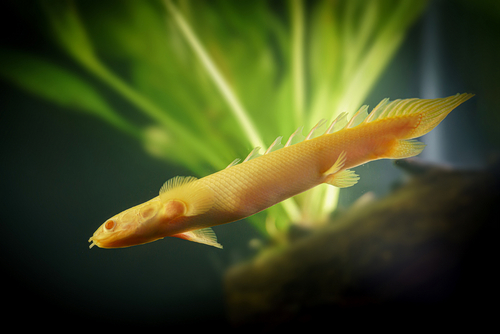The bichir is one of those fish that you can’t help but stare at. They can not only grow pretty large, but they are so distinct and are often compared to prehistoric creatures. When picking tank mates for a bichir, you need to make careful choices.
The best bichir tank mates are fish that don’t look like food. Size is one of the important factors when it comes to tank mates, but not all tank mates have to be large. There are smaller fish that bichirs are known to get along within an aquarium without trying to eat them.
You also want to ensure that the tank mates you select for your bichir aren’t food hogs, as you don’t want to risk your bottom-dwelling bichir going hungry.
Contents
Bichir Tank Mates – What You Should Know
Getting to know your bichir before bringing in companions is good practice. Even fish of the same species may behave differently than what’s known of them, and you want to adapt to your unique fish.
Temperament
The bichir has its quirks, but they are not typically aggressive fish. Making sure they have enough to eat is crucial, as they could end up trying to eat small fish due to their carnivorous diet.
Size
The bichir is a fairly big fish compared to many kept in an aquarium. When they’re adults, they can stretch between one and two feet, even sometimes getting as big as two and a half feet.
Competition
The bichir doesn’t really like to compete with other fish but in some cases, they will if they feel the need to. There should be a few options for hiding spots for all fish, including your bichir, to manage any unruliness.
Parameters ; Tank Setup
The bichir likes soft water and soft substrate, so having some softly textured sand at the bottom as substrate is very important. In addition, they need a sizable tank so they can swim around as they see fit. For water temperature, aim for between 74-82 °F and pH levels between 6.2 and 7.8.
The Best Bichir Tank Mates
You might also like:
1. Oscar
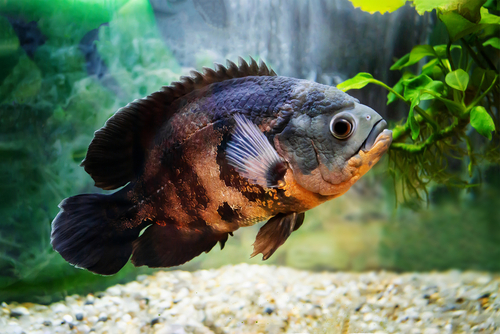
- Scientific Name: Astronotus ocellatus
- Adult Size: 12-14 inches
- Compatible with: Plecos, some cichlids, bichir
- Water Temperature: 74-81 °F
- Minimum tank size: 55 gallons
- Care Level: Moderate
- Origin: South America
An oscar is a lovely looking fish that is known to cohabitate with a bichir very well so long as both are close to the same size. Additionally, oscars are very friendly towards their human parents, often swimming to the glass when they see you walk by.
Pros
- Both fish like the same foods
Cons
- You’ll have to monitor how an oscar eats to make sure your bichir gets enough
2. Black Ghost Knifefish
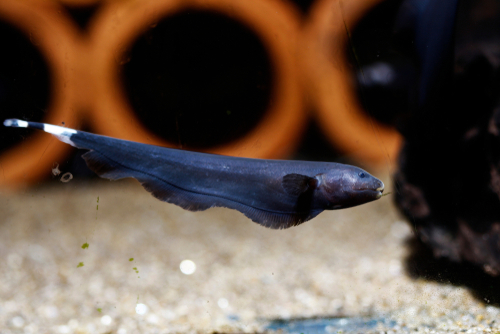
- Scientific Name: Apteronotus albifrons
- Adult Size: 15-20 inches
- Compatible with: Angelfish, large catfish, bichir
- Water Temperature: 75-82 °F
- Minimum tank size: 100 gallons
- Care Level: Intermediate
- Origin: South America
The black ghost knifefish and bichir can live together in peace in an aquarium because they live different lives. This knifefish likes to be up at night and sleep during the day, so everything is fine so long as your knifefish has somewhere to sleep during the day.
Pros
- The black ghost knifefish won’t bother or aggravate your bichir
Cons
- There will need to be a lot of space in your aquarium for both fish
3. Hoplo Catfish
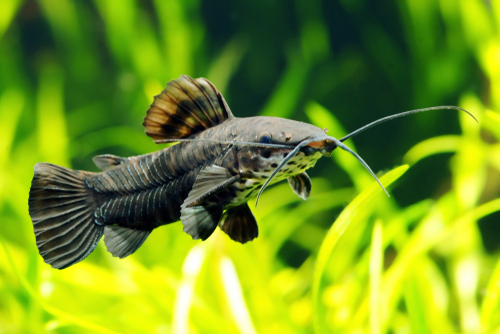
- Scientific Name: Megalechis thoracata
- Adult Size: 8 inches
- Compatible with: Medium sized tetras and barbs, bettas
- Water Temperature: 72-86 °F
- Minimum tank size: 44 gallons
- Care Level: Easy to moderate
- Origin: South America
A hoplo catfish isn’t intimidated by a bichir, and so these two can coexist. The hoplo catfish loves being able to swim around, and since the bichir sticks towards the bottom of the tank, they won’t be bothered by your catfish’s activity.
Pros
- A hoplo catfish is an amiable fish that your bichir will tolerate very easily
Cons
- Both fish enjoy different kinds of food, so you’ll have to purchase multiple kinds
4. Peacock Bass
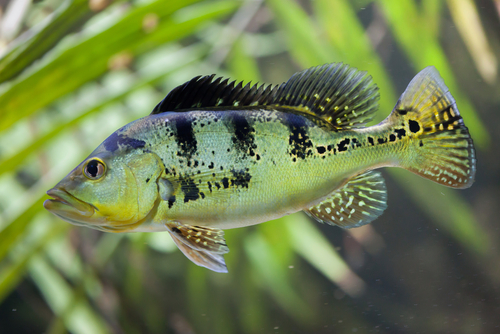
- Scientific Name: Cichla ocellaris
- Adult Size: 24-30 inches
- Compatible with: Oscars, green terror, bichir
- Water Temperature: 75-81 °F
- Minimum tank size: 200 gallon tank
- Care Level: Moderate
- Origin: South America
Bichir and peacock bass can be scary to other fish because they’re so big, their size helps potential companionship work out nicely. A peacock bass is a warm fish, though your bichir may not see much of that; it’s possible they’ll simply just leave each other alone.
Pros
- Both fish grow to be around the same size
Cons
- You are going to need a lot of space for a very large aquarium to house both fish comfortably
5. Clown Loach
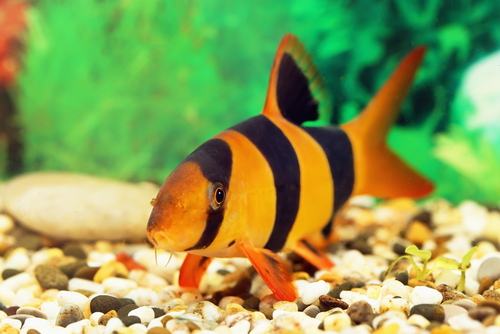
- Scientific Name: Chromobotia macracanthus
- Adult Size: 6-12 inches
- Compatible with: Plecos, rainbow fish, gouramis
- Water Temperature: 75-86 °F
- Minimum tank size: 75 gallon
- Care Level: Moderate
- Origin: South America
You might be nervous about having these two bottom-dwelling fish together, but you needn’t be concerned. When a clown loach has a few friends, they won’t be concerned about a bichir, and your bichir will likely just let the clown loaches be.
Pros
- Both types of fish are bottom dwellers and help control contaminants in the water
Cons
- You will need to have several clown loaches in a tank, especially with a bichir
6. Leopard Bush Fish
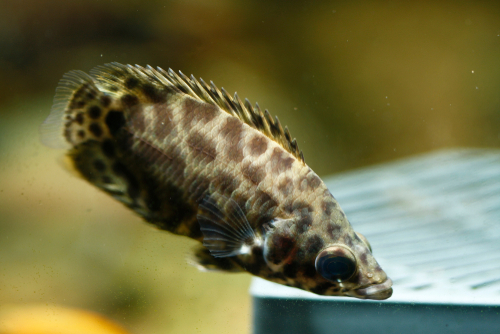
- Scientific Name: Ctenopoma acutirostre
- Adult Size: 6 inches
- Compatible with: Silver dollar, bala shark, medium sized gourami
- Water Temperature: 73-82°F
- Minimum tank size: 55 gallons
- Care Level: Easy
- Origin: Africa
Something fascinating about leopard bush fish is that they can survive out of the water for short amounts of time. Even though the leopard bush fish is known to eat other fish, they likely wouldn’t even try once seeing how big a bichir is.
Pros
- These two fish typically don’t bother each other
Cons
- These fish are only really compatible because they stay out of each other’s way
- Leopard bush fish can only live with smaller bichirs
7. Blind Cave Tetra
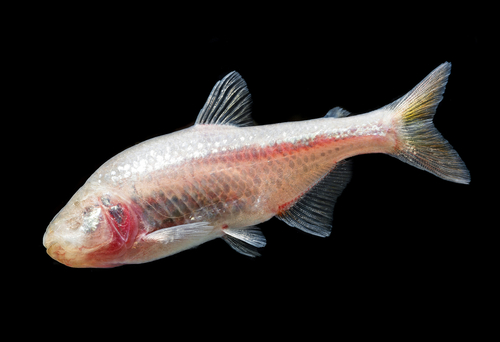
- Scientific Name: Astyanax mexicanus
- Adult Size: 3-4 inches
- Compatible with: Corydoras, barbs, guppies
- Water Temperature: 68-77 °F
- Minimum tank size: 20 gallons
- Care Level: Moderate
- Origin: Central America
The blind cave tetra has some really special senses, so they are able to avoid the bichir as needed. Your bichir likely won’t bother these fish because they won’t see any need to. So long as your blind cave tetras have some hiding spots when needed, everything should remain favorable.
Pros
- The blind cave tetras offer something dynamic and unique to the tank
- Blind cave tetras let you have small fish with big fish, creating interesting contrast
Cons
- They might occasionally get scared of your bichir
- Blind cave tetras need to be in schools
8. Elephant Nose Fish
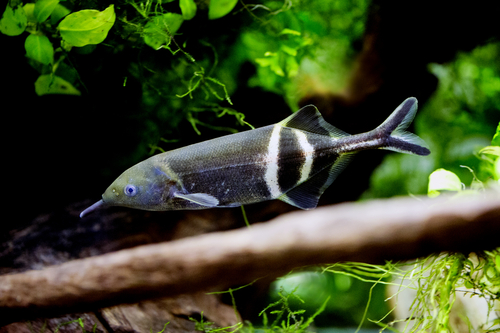
- Scientific Name: Gnathonemus petersii
- Adult Size: 9 inches
- Compatible with: Bichir, discus, cory catfish
- Water Temperature: 79-82 °F
- Minimum tank size: 55 gallons
- Care Level: Moderate
- Origin: Africa
The elephant nose fish and bichir are both fish that stay at the bottom of the tank. However, since the elephant nose fish is a decent size, your bichir is most likely going to get along as well as needed. However, you are going to have to have room for a big tank.
Pros
- Both fish enjoy soft and sandy substrate
- Both fish help keep an aquarium clean
Cons
- You need a spacious tank to house both fish together
9. Silver Dollar
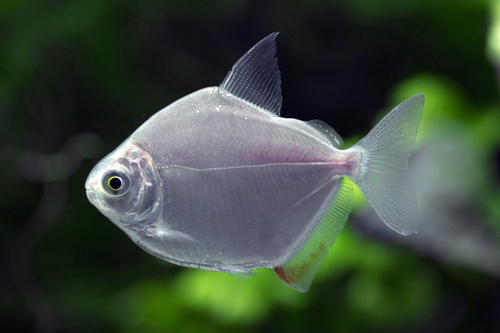
- Scientific Name: Metynnis argenteus
- Adult Size: 4-6 inches
- Compatible with: Oscars, kuhli loach, angelfish
- Water Temperature: 75-82 °F
- Minimum tank size: 100 gallons
- Care Level: Intermediate
- Origin: South America
The silver dollar is an underrated fish perfectly suited for life with a bichir. Both live on different areas of a tank and so they likely won’t ever mingle. Either way, the silver dollar is known to be a very easygoing fish.
Pros
- Silver dollars live at the top of the tank, and bichirs live on the bottom
- Silver dollars add an unmatched beauty to an aquarium
Cons
- Silver dollars need to live in schools with several other silver dollars
10. Axolotl
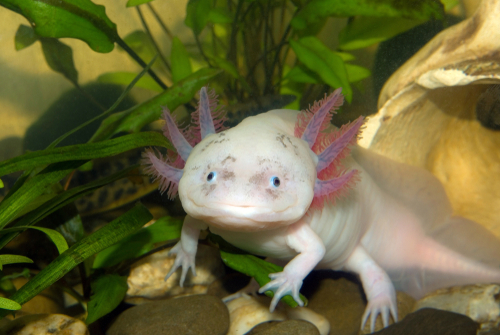
- Scientific Name: Ambystoma mexicanum
- Adult Size: 9-18 inches
- Compatible with: Guppies, adult snails, goldfish
- Water Temperature: 55-68 °F
- Minimum tank size: 20 gallons
- Care Level: Intermediate
- Origin: Mexico
The axolotl has become a very highly desired fish for their adorable features. You might not think about having one of these with a bichir, but pairing these two together helps to fill up all spots of a tank. They likely won’t interact much, but both will be happy.
Pros
- Both of these fish occupy opposite spaces in an aquarium
- Both of these fish like living in the same water parameters
Cons
- The axolotl needs a few options for caves and a ton of space
11. Jack Dempsey
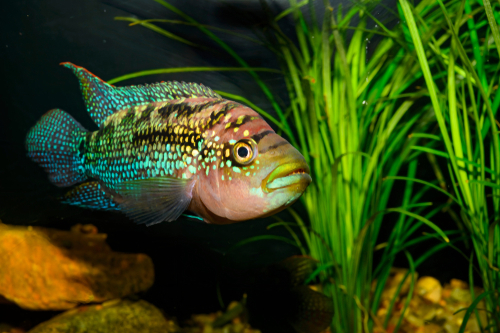
- Scientific Name: Rocio octofasciata
- Adult Size: 10-12 inches
- Compatible with: Oscars, blind cave tetras, bichir
- Water Temperature: 72-86 °F
- Minimum tank size: 55 gallon
- Care Level: Intermediate
- Origin: Central America
The trouble many find with a Jack Dempsey is that they aren’t the friendliest fish, but they’re so gorgeous that when you find a match, you might want to consider it. They get along with bichirs that are on the bigger size since neither will view the other as food.
Pros
- Both fish like eating the same types of foods
Cons
- Jack Dempseys might not be good companions for small bichirs
12. Blue Acara
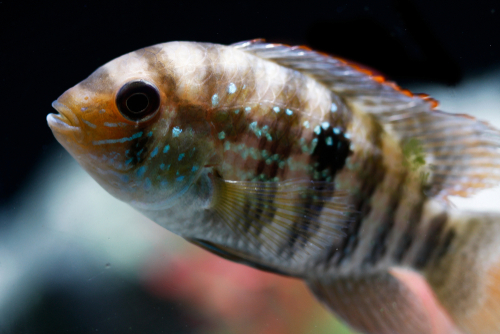
- Scientific Name: Aequidens pulcher
- Adult Size: 6-8 inches
- Compatible with: Discus, angelfish, large barbs
- Water Temperature: 72-86 °F
- Minimum tank size: 55 gallon
- Care Level: Easy
- Origin: South America
The blue acara is an approachable fish that your bichir may not even notice. The blue acara likes to dig, so you’re going to need a solid layer of substrate for them to play in. Some blue acaras can grow to a decent size, so your bichir won’t view them as a snack.
Pros
- The blue acara and bichir can coexist very well in a tank set up appropriately
- The blue acara keeps to itself, so your bichir won’t feel the need to defend themselves
Cons
- Blue acaras shouldn’t have any opportunities to mate inside a tank, as they become very aggressive during this time
Summary
It’s entirely possible to mingle the large bichir with other kinds of fish. Despite what some say, they can live conflict-free with small fish so long as everyone’s needs are met and there are spots for privacy.
If you’re someone who wants a very sizable aquarium at home, a bichir with some of these tank mates will be perfect for you.

Ian Sterling, founder of Fishlab.com, began his aquarium journey over 30 years ago, driven by a deep fascination for fish and their diverse personalities. His website, Fishlab.com, is dedicated to making fishkeeping accessible and enjoyable, offering beginner-friendly guidance, expert insights, and a community for aquarists to connect and share experiences.


